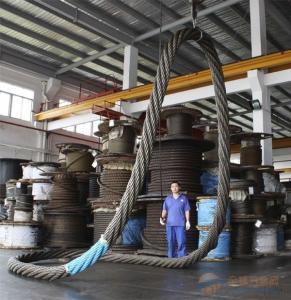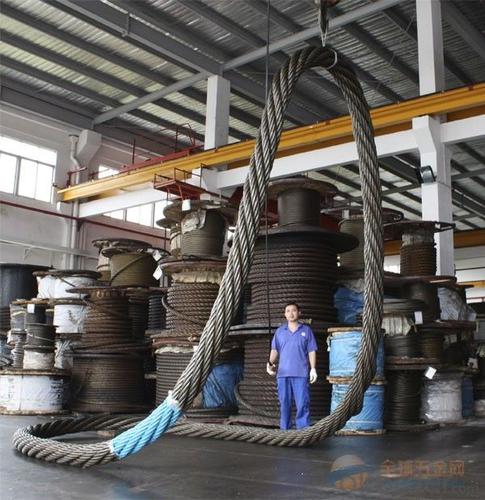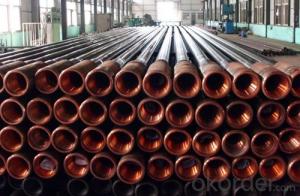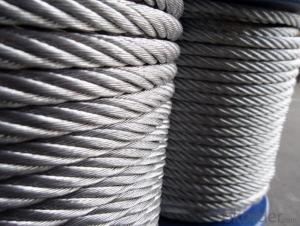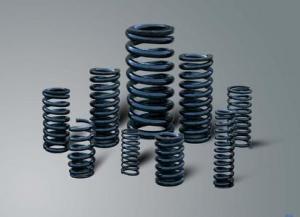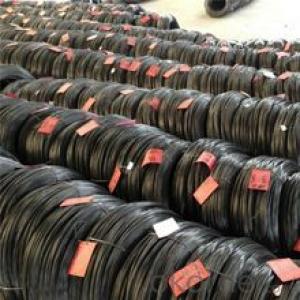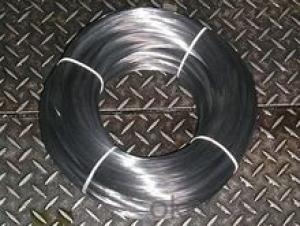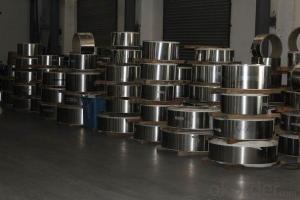Stainless Steel Spring Wire For Crane Hot Sale and High Quality
- Loading Port:
- Shanghai
- Payment Terms:
- TT OR LC
- Min Order Qty:
- 8000 kg
- Supply Capability:
- 10000 kg/month
OKorder Service Pledge
OKorder Financial Service
You Might Also Like
1.Packing And Delivery
Package: Seaworthy package
MOQ: 0.5 tons
Delivery: 15-20 days
Monthly Output: 100 tons
Payment : 30%T/T in advanced+70% balanced;irrevocable L/C at sight
Remarks: All-risk insurance and accept the third party test
Port : Shanghai
AISI 316 high tensile strength stainless steel spring wire
| Detail as follows: | |
| Standard | AISI,ASTM,GB,SUS etc |
| Grade | 201,202,204,301,303,304,304L,310,316,316L etc |
| Diameter | 0.7mm-14.0mm |
| Surface | Bright or matt |
| Condition | hard |
| Tolerance | +/-0.03mm |
| Length | According to customers’ requirement |
| Packing | Packed by weaved bag or according to customer's requirements |
| Technology | Cold drawn |
| Application | Spring |
| Productivity | 300 tons/month |
| MOQ | 100KG |
| Note | We can produce other standard as the customers' requirement |
ODM&OEM SERVICES | |
Service | Drawings or samples processing/OEM/ODM service provided |
Produce Process | Drawings→ mould making → pre-forging →rough machining or finish machining →surface treatment →product checking and quality control→ packing →delivery |
Forging Material | Carbon Steel, Alloy steel, Stainless steel |
Standard | ISO, GB, ASTM, DIN, JIS |
Produce Equipment | Friction Screw Press Series, CNC Lathe, Machining Center (Vertical Spindles), CNC Milling Machine, Bench Drilling Machine, Heat Treatment Equipments and so on. |
Surface treatment | Heat treatment, Polishing, shot blasting, Painting, Electro-plating, Chemical Plating, |
Inspection Equipments | Metallurgical analysis, tensile strength tester, Hardness tester, Altimeter, Scale Micrometer, pressure tester, etc. |
Delivery | Samples are sent by express Large quantity products delivered to customer by sea or according to your request |
Terms of payment | T/T or L/C |
1. Competitive price and quality from our own factory
2. Approved by ISO9001, CE, SGS every year
3. Best service with 24 hour`s reply
4. Flexible payment with T/T,L/C , paypal, kunlun bank, western union, etc.
5. Smooth production ability(50000tons/month)
6. Quick delivery and standard exporting package
7. OEM/ODM
- Q: How are steel pipes used in the infrastructure development?
- Steel pipes are widely used in infrastructure development for various purposes such as water supply, sewage systems, gas pipelines, and transportation of oil and natural gas. They provide a durable and efficient solution for the construction of underground and aboveground infrastructure, ensuring the safe and reliable transportation of fluids and gases. Steel pipes are also used in the construction of bridges, buildings, and other structural components, as they offer strength, versatility, and resilience to withstand harsh environmental conditions.
- Q: How are steel pipes used in data centers?
- Steel pipes are commonly used in data centers for various purposes such as routing cables, running water cooling systems, and providing structural support for equipment. They are used to create a robust and organized network infrastructure, ensuring efficient and reliable data transmission and management within the facility.
- Q: Are steel pipes suitable for use in automotive industries?
- Yes, steel pipes are suitable for use in automotive industries. They are known for their strength, durability, and resistance to high temperatures and pressure, making them an ideal material for various applications such as exhaust systems, fuel lines, and structural components in automobiles. Steel pipes also offer excellent corrosion resistance, ensuring long-lasting performance in harsh environments.
- Q: What are the different types of steel pipe hangers?
- There are several different types of steel pipe hangers that are commonly used in various industries and applications. These hangers are designed to support and secure pipes, ensuring proper alignment and preventing sagging or movement. 1. Clevis Hangers: Clevis hangers consist of a clevis, which is a U-shaped metal bracket, and a threaded rod that connects the clevis to the supporting structure. This type of hanger allows for vertical adjustment and is often used in suspended piping systems. 2. Split Ring Hangers: Split ring hangers are circular metal rings that are split on one side. They can be easily opened and closed around the pipe, providing a secure hold. Split ring hangers are commonly used for suspending horizontal pipes. 3. Beam Clamps: Beam clamps are designed to attach to structural beams or channels, providing a secure mounting point for pipe hangers. They come in various designs, including top flange, bottom flange, and side mount, to accommodate different installation needs. 4. Swivel Hangers: Swivel hangers are used to support pipes that may experience thermal expansion or contraction. These hangers allow the pipe to move horizontally while still providing support and preventing excessive stress on the connections. 5. Riser Clamps: Riser clamps are used to support vertical pipes or risers. They typically consist of a metal band that wraps around the pipe and a threaded rod that connects the band to the supporting structure. 6. Pipe Roller Supports: Pipe roller supports are used in applications where pipes need to move horizontally due to expansion or contraction. These hangers consist of a series of rollers that allow the pipe to move freely while still providing support. 7. Pipe Saddles: Pipe saddles are U-shaped brackets that wrap around the pipe, providing support on both sides. They are often used in applications where pipes need to be secured to walls or other structures. These are just a few examples of the different types of steel pipe hangers available. The specific type of hanger used will depend on factors such as pipe size, weight, location, and required movement allowance. It is important to choose the appropriate hanger for each application to ensure proper support and functionality of the piping system.
- Q: How do you calculate the flow rate of water in steel pipes?
- To calculate the flow rate of water in steel pipes, you need to consider the pipe's diameter, length, and the pressure difference across the pipe. Using formulas like the Darcy-Weisbach equation or the Hazen-Williams equation, you can determine the flow rate by plugging in these variables along with the fluid properties.
- Q: How do you protect steel pipes from rusting?
- Steel pipes can be protected from rusting by applying a protective coating such as paint or zinc coating. Additionally, using corrosion inhibitors, maintaining proper drainage, and keeping the pipes dry can help prevent rust formation. Regular inspection and maintenance are also crucial to identify and address any potential issues before they escalate.
- Q: How are steel pipes used in the construction of water supply systems?
- Steel pipes are commonly used in the construction of water supply systems due to their durability, strength, and resistance to corrosion. These pipes are used to transport water from the source to various points of distribution, such as buildings, homes, and industries. Steel pipes are often buried underground or installed above ground, depending on the specific requirements of the project. Additionally, steel pipes can withstand high pressure and are suitable for carrying large volumes of water, making them a reliable choice for water supply systems.
- Q: What is the difference between steel pipes and cast iron pipes?
- The main difference between steel pipes and cast iron pipes is the material they are made of. Steel pipes are made from an alloy of iron and carbon, making them stronger and more durable. On the other hand, cast iron pipes are made solely from iron, which makes them more brittle and prone to cracks. Additionally, steel pipes have a smoother interior surface, allowing for better water flow and reducing the chance of clogs. Cast iron pipes, on the other hand, have a rougher interior surface and are more susceptible to corrosion. Overall, steel pipes are typically preferred for their strength and longevity, while cast iron pipes may be used in specific applications where their unique properties are advantageous.
- Q: How are steel pipes protected against electromagnetic interference?
- Steel pipes can be protected against electromagnetic interference by applying a layer of insulating material around the pipes or by utilizing electromagnetic shielding techniques such as wrapping the pipes with conductive materials. Additionally, grounding the pipes and implementing proper grounding practices can help minimize the impact of electromagnetic interference.
- Q: How are steel pipes used in the construction of power transmission lines?
- Steel pipes are commonly used in the construction of power transmission lines as they provide a strong and durable structure to support the weight of the lines and withstand environmental conditions. These pipes serve as the main support structure for overhead power lines and are often used to elevate the lines above ground level or across bodies of water. Additionally, steel pipes are used to protect and encase underground power cables, ensuring their safety and longevity.
Send your message to us
Stainless Steel Spring Wire For Crane Hot Sale and High Quality
- Loading Port:
- Shanghai
- Payment Terms:
- TT OR LC
- Min Order Qty:
- 8000 kg
- Supply Capability:
- 10000 kg/month
OKorder Service Pledge
OKorder Financial Service
Similar products
Hot products
Hot Searches
Related keywords
